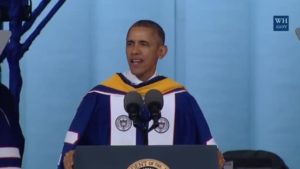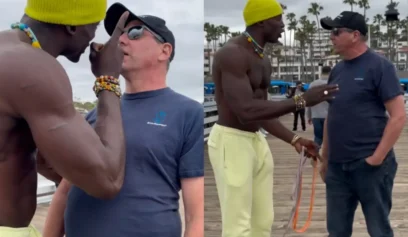
President Obama delivers commencement address to Howard University students on May 7, 2016.
Officials from the White House and Department of Education will host 15 private and public higher education institutions from across the country Friday who have committed to reducing barriers for applicants with criminal histories.
These colleges and universities have already signed President Barack Obama’s Fair Chance Higher Education Pledge, an initiative that will see sweeping changes to admissions practices that traditionally discourage otherwise highly qualified students from applying and enrolling in post-secondary institutions.
Domestic Policy Council Director Cecilia Muñoz and Secretary of Education John King will be on hand to celebrate the measure’s founding supporters.
“This is about persuading institutions to do the right thing with respect to how they admit their students,” King said, per the Atlantic. “This effort is about removing arbitrary obstacles.”
According to the White House, those taking the pledge have promised to demonstrate ongoing efforts to go “Beyond the Box” with their admissions applications, a reference to the the Education Department’s recent guide on the use of criminal justice information questions on college applications.
In addition, the institutions pledge to “take action” in their surrounding communities by encouraging professors and students to teach in correctional facilities and making sure internship and job training opportunities are available to those with criminal records.
Finally, the schools will “set an example” for peers. The White House has provided a link to the pledge on its website, so additional institutions can sign without paperwork.
A total of 25 institutions, including Washington HBCU Howard University, have joined the efforts. Other notable universities include Auburn University, Columbia University, New York University, Rutgers University and the entire University of California System.
The Obama Administration has taken a keen interest in criminal justice reform at the sunset of his presidency. The subject was the focus of many addresses and executive acts throughout last summer and into the fall.
At the NAACP’s National Convention last July, the president emphasized the need for lighter sentencing and “second chances” for those with federal convictions.
“While the people in our prisons have made some mistakes — and sometimes big mistakes — they are also Americans, and we have to make sure that as they do their time and pay back their debt to society that we are increasing the possibility that they can turn their lives around,” Obama told the crowd. “Justice and redemption go hand in hand.”
A day before the address, he commuted the sentences of 46 drug offenders, 14 of which had been given life sentences for non-violent offenses.
“I believe we can address the disparities in the application of criminal justice, from arrest rates to sentencing to incarceration. And I believe we can help those who have served their time and earned a second chance get the support they need to become productive members of society, ” the President said during a weekly address in October 2015.


